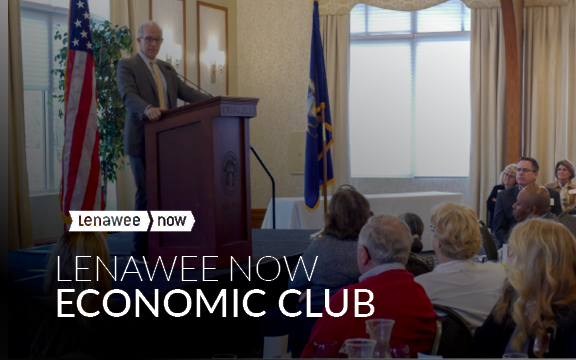It was a unique blend of perspectives as change-makers in business, education, non-profits, and community development engaged with one another on timely economic issues at the Lenawee Economic Club’s inaugural luncheon, held on Adrian College’s campus. Over the course of the luncheon, patrons learned about upcoming options in education from the Manager of Align Talent Consortium, Sheila Blair, and Adrian College President, Dr. Jeffrey Docking.
Blair shared a fictional story to highlight the potential of the Consortium’s work. Olivia Jeffries, a child who had a unique love of heights and climbing, much to her parents’ chagrin whenever they saw her at the top of the stairs.
In the 3rd grade, Olivia attended Careers in Motion, a career fair put on by Align Lenawee in partnership with the LISD TECH Center. At that event, she saw a lineman for DTE Energy, who dealt with the maintenance of electrical poles. Since she was very interested in the role of the lineman, particularly the altitude he ascended, she therefore gravitated in that direction. From that encounter, an idea started forming about her future career path. In the 6th grade, Olivia participated in another Align event, where she was pen pals with an individual in a career field of interest to her. Naturally, she opted to write a lineman.
Some years, later in high school, when searching for post-high-school options, she was put in contact with Michigan Works South East to help her further look into the role of a line person, which lead to her starting an apprenticeship beginning at $40 an hour. Blair used this story to emphasize the importance of career initiatives, starting in middle school. Although students don’t need to commit to a certain career, gaining experience and a badge denoting some facet of mastery can be greatly beneficial to students as they explore higher education and career paths.
Featured Speaker, Dr. Jeffrey Docking, discussed the state of higher education and the initiatives that are being acted upon to increase quality therein. Docking shared a Gallup Survey of academic provosts, inquiring about how many students were ready to make an impact in the workforce after graduation. According to the provosts, 80% of students would be immediately effective members of the workforce after graduation. Gallup asked employers the same question. Employers asserted 80% of students would not be immediately effective in their first job upon graduation. This disconnect causes problems for employers and students alike. This problem was made especially poignant after a conversation Dr. Docking had with an individual who worked for Google.
After Dr. Docking shared the struggles and successes of his school, the Google worker noted that his company had problems as well. Mainly, those related to employment; Google had several open positions and an insufficient number of workers with skills in cyber security, information technology, etc.
Dr. Docking realized that additional curriculum majors were needed to address this disconnect. Unfortunately creating a new major at a college is a very difficult endeavor, it requires new curriculum, additional professors, and several facets of academic infrastructure. However, Dr. Docking had a solution. Rather than create new majors independently, he would collaborate with other private liberal arts colleges and utilize online technology so they could share curriculum with each other. Thus, by adding a few topic specific online courses already offered by partner colleges to Adrian College’s existing curriculum they could create new and much-needed majors.
Through this exchange, Adrian College has created 17 new majors from subject matter experts in some of the most in-demand fields, better-preparing students for employment after graduation.
After the event, individuals stayed to continue their conversations, as Dr. Docking signed copies of his book The College of the Future.
Special thanks are owed to the Sponsors of the Luncheon. Michigan Works Southeast, DTE Energy, Clift Buick & GMC, and Creek Enterprises.

